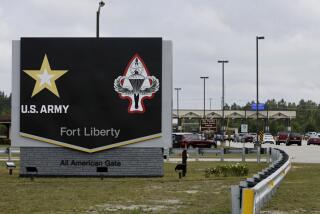Armed With Cash and Itching to Spend It
- Share via
COLUMBUS, Ga. — A week ago, Pfc. Anthony Calla became the proud owner of the only metallic blue Ford Mustang at Ft. Benning.
“There are other Mustangs,” said Calla, 24, of Modesto, Calif., as he polished the chrome rims of his very first car. “But I got the only blue.”
In the last month, as more than 3,500 troops of the 3rd Brigade, 3rd Infantry Division have returned to Ft. Benning from a yearlong deployment in Iraq, the military base’s parking lots have filled with muscle cars, Hummers, Lexuses, Dodge Rams and BMWs.
Senior military officers complain that businesses are too eager to take advantage of their troops.
“This is a GI town,” said Maj. Steven Warren, spokesman for the 3rd Brigade Combat Team. “The first thing everyone does is buy a new car. We try to let them know [that] a place like this attracts vultures.”
Many soldiers arrived in Columbus knowing exactly which car they wanted.
From their base in Baquba in Iraq’s Diyala province, they logged on to computers and obsessed over the details of the latest sports cars and SUVs. Some pinned photos to their walls.
By the time the soldiers -- who earned $700 to $1,000 extra for each month in Iraq -- returned to Ft. Benning, senior officers struggled to persuade them to save.
“The urge to buy outweighs everything,” said Col. Daniel Kessler, the brigade’s deputy commander, who bought a Tahoe deck boat this month. “It’s all about instant gratification.”
At Ft. Benning, every soldier attended a mandatory re-integration briefing, where -- among other things -- they were warned not to sign any contracts in the first few days.
After that, many headed to the car dealerships.
Some soldiers seemed to walk in as soon as they got off the plane, said Mike Silver, general sales manager of Carl Gregory Dodge. “Their heads were literally bobbing from lack of sleep,” he said.
Although younger soldiers were not the only ones who bought cars -- Maj. Michael Charlebois, a 3rd Brigade civil military officer who bought a yellow Hummer this month, has owned 38 automobiles and 18 motorcycles in his 18-year military career -- senior military officers worry that the younger service members lack the experience to negotiate with car dealers.
One morning last week, when the 3rd Brigade’s senior officers met at Ft. Benning to monitor the progress of troops’ reintegration, Brigade Commander Col. Steven Salazar voiced concern about a car dealer who sold a soldier a 2001 Chevrolet Malibu at a 19.9% annual interest rate.
“Go after that car dealer and twist his arm,” Salazar said.
A few hours later, Phillip Holt, finance manager at Billy Cash Auto Sales -- the used car dealership that sold the Malibu -- said he received a telephone call from an Army lawyer warning him that Ft. Benning’s Armed Forces Disciplinary Control Board might investigate the store if he did not renegotiate.
If military officers suspect a business of unfair or illegal practices, they can ask the owner to appear before the disciplinary control board, which has the authority to declare a business off-limits to military personnel.
Last year, Drive 1 of Columbus -- a car dealership that, according to the Better Business Bureau, priced vehicles far higher than Kelley Blue Book value and added extra insurance and extended warranties -- was put on the Army’s off-limits list. It went out of business several months later.
Holt, who said that interest rates of 18% to 25% were the industry standard for any young person with bad credit, complained that senior officers had come to expect preferential treatment for their troops.
“They think that just because a uniform is being worn their pay history should be overlooked,” he said. “Yes, they are saving our freedom, but a credit union isn’t going to see it like that.”
John C. Moore, brigade judge advocate for the 3rd Brigade Combat Team, agreed to some extent.
“Technically, a 19.9% rate is not illegal,” he said, adding that such an interest rate was standard for anyone with bad credit. “But at Ft. Benning it gets people’s emotions going. Sometimes they paint very negative pictures of car dealers. Sometimes it’s fair. Sometimes it’s not.”
Of course, fairness is a tricky concept: While car dealers tend to insist they are giving consumers good deals, customers have doubts -- especially after they have signed a contract.
Such tension is magnified in Columbus -- a West Georgia town with a population of about 186,000 -- where there are more than 110 new and used licensed car dealerships.
As Mike Gaymon, president of the Greater Columbus Georgia Chamber of Commerce said: “We have thousands of young soldiers here who are impulse buyers.”
Yet he insisted that the vast majority of businesses treat soldiers fairly.
“If they don’t, they get no sympathy,” he said. “What’s good for Ft. Benning is good for Columbus, and what’s bad for Ft. Benning is bad for Columbus.”
Ft. Benning -- the Army’s largest training installation -- is the town’s largest employer, contributing more than $100 million to the local economy each month.
For years, many of the larger car dealers have cultivated their relationships with Ft. Benning by employing military liaison officers and contributing funds to welcome home ceremonies.
Last year, in an effort to protect members of the armed forces from “unsavory con artists,” the Columbus Better Business Bureau established a Military Marketplace Code of Ethics, a program that encouraged businesses to commit to treating soldiers fairly.
Some soldiers, though, say they have learned not to make big purchases in Columbus.
“It’s well known we’re a cash cow for Columbus,” said Lt. Tony Canorvo, 28, a platoon leader. “Everyone wants to sell us flashy things. See all the cars around here? Wait. In a few months, they’ll be repossessed.”
More to Read
Sign up for Essential California
The most important California stories and recommendations in your inbox every morning.
You may occasionally receive promotional content from the Los Angeles Times.














